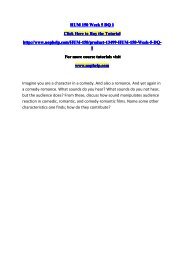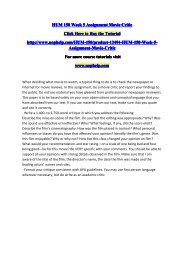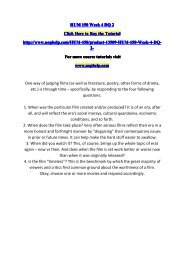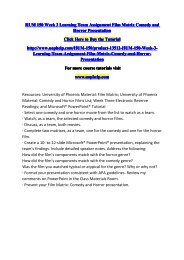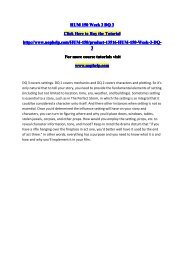HUM 150 Week 3 DQ 2/UopHelp
For more course tutorials visit www.uophelp.com Coordinating your responses here with DQ 1, consider the story you wish to tell. Stories require conflict, or at least a lot of tension, in order to generate interest. So, first, what's the conflict in your story and how are you plotting it out? Also, movies, like plays and TV but unlike books, must use what's called the “objective point-of-view” because they cannot show directly what characters are thinking and feeling. They are limited to showing the exterior of characters in ways that reflect what's going on internally. And they do so in compact units called “scenes” made up of action, mannerisms, and dialogue. So who would be your characters? Why? How would you have them act in what sort of scenes? Why? What is your dialogue trying to accomplish? Why? And what would you suggest to others about their plots and story-telling elements?
For more course tutorials visit
www.uophelp.com
Coordinating your responses here with DQ 1, consider the story you wish to tell. Stories require conflict, or at least a lot of tension, in order to generate interest. So, first, what's the conflict in your story and how are you plotting it out?
Also, movies, like plays and TV but unlike books, must use what's called the “objective point-of-view” because they cannot show directly what characters are thinking and feeling. They are limited to showing the exterior of characters in ways that reflect what's going on internally. And they do so in compact units called “scenes” made up of action, mannerisms, and dialogue. So who would be your characters? Why? How would you have them act in what sort of scenes? Why? What is your dialogue trying to accomplish? Why?
And what would you suggest to others about their plots and story-telling elements?
- No tags were found...
Create successful ePaper yourself
Turn your PDF publications into a flip-book with our unique Google optimized e-Paper software.
<strong>HUM</strong> <strong>150</strong> <strong>Week</strong> 3 <strong>DQ</strong> 2Click Here to Buy the Tutorialhttp://www.uophelp.com/<strong>HUM</strong>-<strong>150</strong>/product-13517-<strong>HUM</strong>-<strong>150</strong>-<strong>Week</strong>-3-<strong>DQ</strong>-2For more course tutorials visitwww.uophelp.comCoordinating your responses here with <strong>DQ</strong> 1, consider the story you wish to tell. Storiesrequire conflict, or at least a lot of tension, in order to generate interest. So, first, what's theconflict in your story and how are you plotting it out?Also, movies, like plays and TV but unlike books, must use what's called the “objective pointof-view”because they cannot show directly what characters are thinking and feeling. Theyare limited to showing the exterior of characters in ways that reflect what's going oninternally. And they do so in compact units called “scenes” made up of action, mannerisms,and dialogue. So who would be your characters? Why? How would you have them act inwhat sort of scenes? Why? What is your dialogue trying to accomplish? Why?And what would you suggest to others about their plots and story-telling elements?





